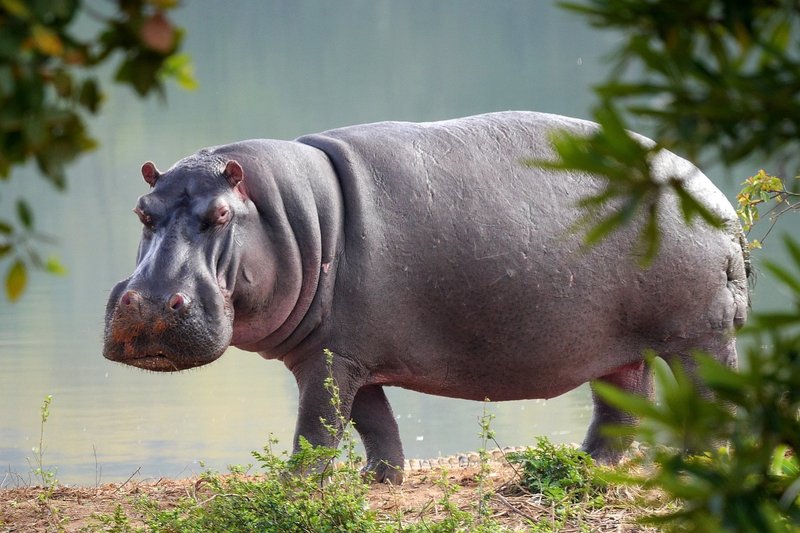
So, can the hippopotamus really be dangerous to humans? Let’s dive into that question and explore the world of these fascinating creatures. We’ll look at their behavior, habitat, and numerous encounters with humans, revealing why these hefty mammals might not be as cuddly as they appear.
Understanding Hippopotamus Behavior
To grasp why hippos can be dangerous to humans, it’s essential to understand their behavior. Hippos are known for their territorial nature, especially when it comes to water. They spend most of their days submerged, but that doesn’t mean they’re snoozing away. In fact, they can be quite alert and aggressive if they feel threatened.
Territorial instincts kick in when they perceive an intruder. Whether it’s another hippo or a human boat cruising too close, hippos are likely to react defensively. It’s like having a personal space bubble that, if popped, can lead to unexpected results.
Furthermore, hippos have powerful jaws that can open up to 150 degrees. Imagine a mouth that can crunch bones with ease! When they feel challenged, they might charge out of the water at surprising speeds—up to 20 miles per hour. That’s faster than most people can run!
Common Encounters Between Hippos and Humans
Many incidents involve hippos attacking boats or humans who unknowingly wander too close to their territory. For example, in many African countries, fishermen have had run-ins with hippos while out on the water. The hippos perceive their boats as threats, leading to dangerous confrontations.
Water safety becomes paramount in areas where hippos are known to reside. It’s vital for locals and tourists alike to be educated about these creatures and their habitats. Similarly, in some regions, people have suffered injuries from hippos that strayed onto land and charged when surprised by humans.
Here’s the thing: while a hippo might seem uninterested lounging on the riverbank, they can turn aggressive in an instant. These situations remind us of the importance of respecting wild animals and giving them their space.
Why Do Hippos Attack?
You’re probably thinking, “What triggers a hippo to attack?” Most often, it boils down to fear and defense. Hippos are protective creatures, especially when it involves their young. A mother hippo will fiercely guard her calf, viewing any perceived threat as a cause for action.
Another reason could be competition for resources—like food and territory. If a hippo feels crowded or challenged, they won’t hesitate to defend their claim. This protective nature means humans can easily find themselves in the crosshairs if they don’t respect their space.
In many cases, hippos are involved in accidental attacks. A boat hitting a hippo can lead to a startled reaction that puts both the animal and people in danger. It’s a reminder that nature doesn’t always play by our rules.
Statistics on Hippo Attacks
Believe it or not, hippos are responsible for more human fatalities in Africa than lions. Reports suggest that they cause around 500 deaths per year. This number might seem shocking, but it underlines the reality of living near these giants.
Let’s break it down a little further. Most attacks occur when:
- People unknowingly invade their territory
- Fishermen get too close to a mother with her young
- Tourists venture into waters where hippos are known to roam
The key takeaway? Hippos aren’t out to hunt humans; they’re reacting to perceived threats. Respecting their habitat is crucial to avoiding these dangerous encounters.
How to Stay Safe Around Hippos
If you ever find yourself in hippo territory, a few safety tips can help keep you out of harm’s way. First and foremost, keep your distance—a good rule of thumb is to stay at least 50 meters (about 165 feet) away from any hippos you spot.
When in boats, avoid making noise or sudden movements. Hippos are territorial, and loud disturbances can trigger aggressive behavior. Always be mindful of your surroundings and understand that these creatures can be unpredictable.
If you’re on land, it’s wise to check for any signs of hippos before venturing into the area. Look for droppings or tracks, which indicate their presence. If you see their tracks, it might be a good idea to turn around and find another route.
Conservation and the Importance of Hippos
Despite their dangerous reputation, hippos play a vital role in their ecosystems. They help maintain the health of the rivers they inhabit, as their dung enriches the water. This process supports a variety of life, from fish to plant species.
Conservation efforts focus on protecting their habitats and minimizing human-wildlife conflict. When communities understand the importance of hippos, they’re more likely to advocate for protective measures and coexist peacefully.
So while hippos might be dangerous, they’re also crucial to the health of their ecosystems. Just like a double-edged sword, they remind us that nature can be both beautiful and perilous.
The Future of Hippos and Humans
Looking ahead, the relationship between hippos and humans will depend heavily on education and awareness. As more people travel to these regions, understanding hippo behavior and safety measures becomes essential.
Moreover, as climate change impacts their habitats, both humans and hippos will face challenges. Conservation programs aim to address these issues, highlighting that protecting natural habitats is vital for the survival of both species.
Honestly, we can learn a lot from understanding hippos better. By fostering a respectful coexistence, we can protect these impressive animals while ensuring human safety.
As you can see, hippos can indeed be dangerous to humans, but with knowledge and respect, we can minimize risks, all while admiring these magnificent creatures from a safe distance.

